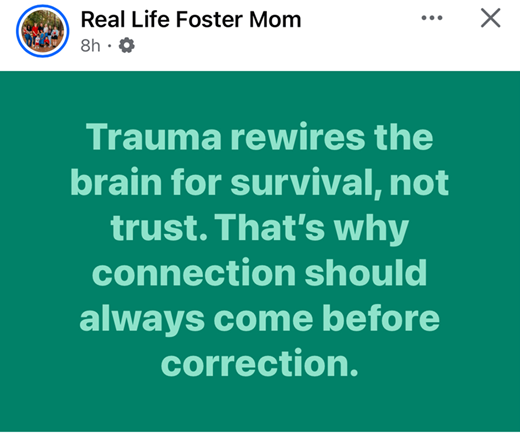therapeutic foster care
We help foster carers in Wales provide safe and loving homes for children in their community. Every child in foster care will have experienced some form of trauma in their early life, and foster carers need to respond to their individual needs.
Therapeutic foster care is a way of parenting which supports the complex emotional needs of children and young people who have been through traumatic experiences such as neglect or abuse.
Support from a trauma-aware team can wrap around a child and their foster carer when there are additional challenges, providing extra support and increasing access to therapeutic services.
why do you need to parent therapeutically?
Regardless of a child’s background, the disruption to a family bond, rejection, neglect, abuse, or even prenatal exposure can have a lasting impact on their nervous system and overall mental health.
Ultimately, every child within the fostering community has been exposed to some form of trauma, even if it’s not explicitly in the more physical ways we hear about. This often has a lasting subconscious impact, which presents as challenging behaviour – whether it’s meltdowns and emotional outbursts out of the blue, or trouble trusting new people.
From a therapeutic perspective, this is known as being stuck in survival mode – the children’s bodies holding the memories of the trauma, even if their conscious minds don’t. It can be one of the main reasons why things don’t feel right to them, even if they’re in a safe environment.
what is therapeutic foster care?
Therapeutic foster care isn’t just about managing challenging behaviours. It’s about building the foundation for healing and recovery by creating an environment of trust and safety. This is something all children and young people can benefit from.
Therapeutic fostering offers a powerful, relationship-based approach to healing and recovery from childhood trauma. It starts by deeply understanding the emotional, behavioural, and psychological impact that traumatic experiences in early life can have. Then, foster carers are better equipped to respond with empathy, consistency, and therapeutic insights. Step by step, they can become that trusted adult that every child and young person needs.
The journey is often complex and long, but with the right support, foster children can recover from their traumatic beginnings and develop into emotionally resilient, thriving individuals with a renewed sense of hope, purpose, and belonging. Through therapeutic foster care, their story can become one of hope.
what does therapeutic foster care involve?
As a therapeutic carer, you’ll support the children in your care with their healing journey, encouraging them to build resilience and form loving relationships with those around them.
The main goal of therapeutic fostering is to help young people process the negative experiences from their past and learn to communicate their emotions in a healthy way.
Building trust is a key element of the therapeutic parenting approach, and the foundation for the young person to develop renewed feelings of security and being valued.
Often, the behaviour responses children have developed were originally a way to protect themselves from abuse and neglect, in response to their circumstances and experiences.
This will present differently in each child; therapeutic foster care means developing your skills and building a natural toolkit of ways to respond to different children’s needs therapeutically.
therapeutic vs traditional parenting
When it comes to therapeutic fostering, experienced parents might find themselves wondering – how children will ever learn with a softer approach? But it’s important to realise that forming these bonds first is what opens up the opportunity for young people to learn, once they feel safe in their new environment.
In these scenarios, punishment can serve only to push children further away and cause their negative feelings, such as anger and shame, to grow. Responding in an empathetic way and looking to connect with them, on the other hand, is the first step to teaching them healthier behaviours.

therapeutic fostering in action
So, how is therapeutic foster care different from other types of foster parenting? It flips the pillars of parenting on their head, and instead of giving a child time out, giving them time ‘in’. When they act out, sit down with them and help them process what’s going on – make sure they know you’re there for them and ready to listen.
“I have sat many an evening in silence with one of our children in their room as they have ranted and screamed and then thrown themselves on the bed! My calm presence (which I have to work really hard to convey) will eventually regulate the child!” – therapeutic foster carer
This can be exhausting for both child and carer, but making sure to have a conversation – even if it’s a few hours or a day later – will do wonders to encourage progress, no matter how small. These types of conversations often work well paired with other activities, like a walk or a drive, where there’s no intense eye contact, and the background activity has a regulating effect, encouraging child and parent to listen to each other.
Offering young people the right language to express themselves can also encourage conversation. Try phrases like “I wonder if you were feeling…”, or “Those were big emotions you were feeling…”, and see where the chat takes you.
Learn more about therapeutic parenting

The Body Keeps the Score by Bessel Van Der Kolk
This book provides insight into how trauma impacts a child’s brain and body, influencing their behaviour and emotional responses. Traumatic experiences can rewire the brain, affecting a child’s ability to regulate emotions, feel safe, and build healthy relationships. A therapeutic approach helps foster carers to look beyond the behaviour and implement trauma-informed practices to help children heal and thrive in their care.

Mixed Signals newsletter by Gareth K. Thomas
Gareth (LinkedIn) emphasises the importance of keeping promises, a calm tone, structure, visual timetables, and predictability, to show children that we are not leaving. This helps young people in survival mode who feel that everything is a threat, seek connection, and constantly check “Are we ok?”.
He describes children as “excellent earthquake detectors” picking up on the slightest change, and predicting rejection. He busts the myths that therapeutic foster care is a soft approach that is “letting them get away with it”.

Foundational Parenting Skills for Foster Parents
Parenting a child who’s experienced trauma is not the same as traditional parenting, and, arguably, gentle parenting doesn’t provide full support either. Sticker charts, punishments, and time-outs often don’t work, and can actually harm the new relationship you are building. This video (YouTube) walks you through the six foundational trauma-conscious parenting skills every first-time foster parent needs to know.
therapeutic fostering training and support
The level of therapeutic support available can be flexible and responsive to children’s needs, with access to trained therapists to create a plan for supporting the child within the foster home or within therapy sessions.
Rest assured, we’ll be there for you every step of your therapeutic foster care journey. We’ve designed our training with specialist knowledge on how to support you and the children you welcome into your home.
To new foster carers, therapeutic fostering may seem daunting; to seasoned carers, it can be an ever-evolving puzzle full of discovery.
Therapeutic foster care uses strategies rooted in trauma-informed care and recovery, attachment theory, and child development principles. It involves implementing techniques designed to encourage empathy and openness between children and therapeutic carers. For example, PACE (Playfulness, Acceptance, Curiosity, and Empathy) will further support the emotional development of these young people, while also strengthening your relationship with them.
Here are a few words, phrases, and training courses that you will encounter within the range of therapeutic foster care training we offer as part of the Foster Wales learning and development framework:
- Developing a secure base and promoting attachment – one of the core steps in therapeutic parenting is creating an environment where children find stability and feel secure enough to focus on forming healthy attachments with those around them.
- Understanding challenging behaviour and promoting positive strategies – when you’re first paired with a child, we’ll share all the information we have on their background, which informs their individual therapeutic fostering needs. This means you’ll be better equipped to empathise with them and respond appropriately to their behaviours.
- Therapeutic reparenting – as part of this approach, carers ensure the emotional needs of young people in their care are met in ways they haven’t been during the child’s early life. Through empathy and a calm approach to boundaries, the foster family teaches children a new way of building relationships.
- Advanced attachment and trauma – as part of therapeutic fostering training, carers learn more about the way traumatic early life experiences, such as abuse or neglect, can have a profound impact on a young person’s ability (and willingness) to trust and connect.
- Advanced strategies to deal with challenging behaviour – in addition to more general ways to recognise behaviours which stem from trauma and respond in supportive ways, you can dive deeper into the subject and arm yourself with a series of practical therapeutic tools.
- Understanding children and young people’s mental health – as part of therapeutic fostering, you will also take a look at emotional challenges children might currently face, whether that’s developmental difficulties, anxiety, or depression. Having a better understanding of foster children’s mental health would help you spot any signs of mental ill-health and offer support.
- Therapeutic play – this normally refers to joint play sessions between children and their carers. During these sessions, tailored and structured activities encourage attachment and help form a positive relationship between the young people and their foster family.
what additional therapeutic fostering support is offered?
Through your local Foster Wales team, you’ll have access to support services or teams of psychologists and therapists who specialise in supporting children and their foster carers. They will work with you to better understand and manage the behaviour of young people in your care.
As children go through life, their behaviour and responses may fluctuate depending on triggers, hormones, or feelings of instability. We want to support their move towards better futures and help prevent issues from escalating. Being trauma aware helps you to unpick, understand, and respond to children, while also reflecting to adjust your own behaviour.
If you’re caring for an individual child who we know will need a high level of support, or you are regularly providing this level of care to young people ‘stepping-down’ from residential care, for example, you may be offered a local support package with increased fee payment to the carer.
This support can adapt to your needs and those of the child, providing extra help 24/7 when you need it most.
